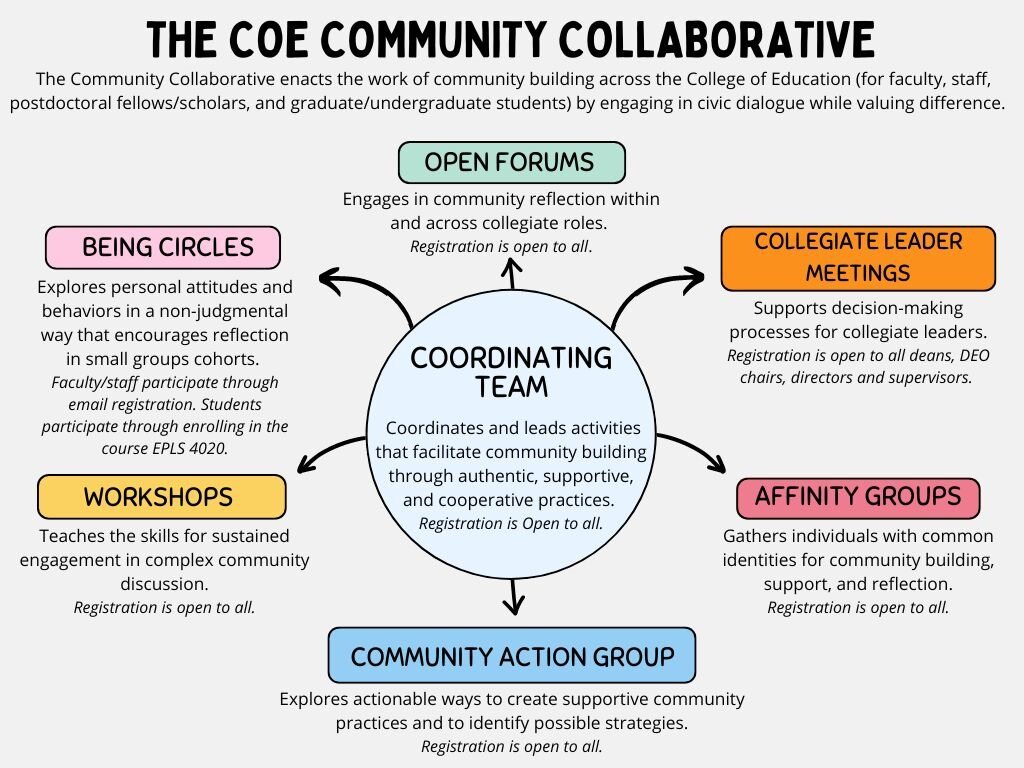The Community Collaborative Initiative enacts the work of community building across the College of Education (for faculty, staff, postdoctoral fellows/scholars, and graduate/undergraduate students) by engaging in civic dialogue while valuing difference.
Participation is voluntary.
The Community Collaborative Objectives:
- Just, Equitable, Inclusive, and Process-Oriented. Employs strategies that shift toward an intentional focus on process while also seeking outcomes for social/community change.
- Ongoing Humanizing Practice. Provides a pathway for members in the community to be in a process together as partners, supporting practices that are transformative, holistic, sustainable, and life-giving. Aims to pursue social change and to improved community relations through full and authentic participation of all members.
- Conflict Accepting. Embraces conflict as a natural part of the process of being in community together. Supports individuals and communities in building the stamina to work through dissonance in humane ways.
- Community Transformation Through Individual Investment. Seeks to balance the responsibility and involvement of individuals (in role relevant ways) with the interest of community.

The COE Community Collaborative: The Community Collaborative enacts the work of the community building across the College of Education (for faculty, staff, postdoctoral fellows/scholars and graduate /undergraduate students) by engaging in civic dialogue while valuing difference.
- Coordinating Team: Coordinates and leads activities that facilitate community building through authentic, supportive, and cooperative practices. Registration is Open to all.
- Open Forums: Engages in community reflection within and across collegiate roles. Registration is open to all.
- Collegiate Leader Meetings: Supports decision-making processes for collegiate leaders. Registration is open to all deans, DEO chairs, directors and supervisors.
- Affinity Groups: Gather individuals with common identities for community building, support, and reflection. Registration is open to all.
- Community Action Group: Explores actionable ways to create supportive community practices and to identify possible strategies. Registration is Open to all.
- Workshops: Teaches the skills for sustained engagement in complex community discussion.
- Being Circles: Explores personal attitudes and behaviors in a non-judgmental way that encourages reflection in small groups cohorts. Faculty/staff participate through email registration. Students participate through enrolling in the course EPLS 4020.
Registration for 2024-25 is OPEN!
Open Forums
Open Forums are monthly, college-wide meetings that spark community reflection within and across collegiate roles. It is an opportunity to engage in civic dialogue while valuing difference, with an eye toward building a more inclusive community within the College of Education (COE). Registration for Open Forums is open to all in the College of Education.
Being Circles
Being Circles are small group cohorts that create space and opportunities for reflection and exploration of personal attitudes and behaviors that inhibit individual and organizational transformational change in our professional lives. Being Circles help build personal stamina and community relationships. Registration is open to all.
- Faculty, staff, and postdoctoral research fellows register here.
- Undergraduate and graduate students
- Fall 2024 - register for Being Circles groups
- Spring 2025 - enroll in Being Circle course
Affinity Groups
Affinity Groups are gatherings of individuals with common identities for community-building, support, and reflection. Affinity Groups are open to all COE students, staff, faculty, postdoctoral research fellows, and administrators. Registration is open to all.
Being Circle course/ Engaging in Civic Dialogue EPLS 4020
This course is an extension of the Being Circles groups, but offered in a course format that teaches the skills and practices that support engaging in challenging classroom/academic discussions and civic dialogues. By applying intentional and humanizing practices, students will develop leadership skills and build the stamina to participate in civic dialogues that transform society.